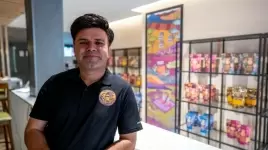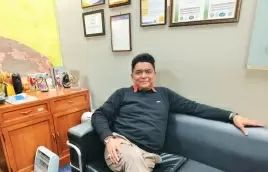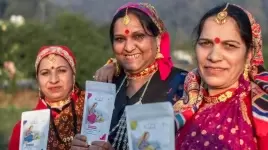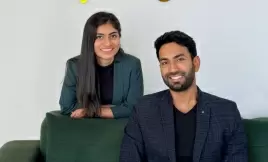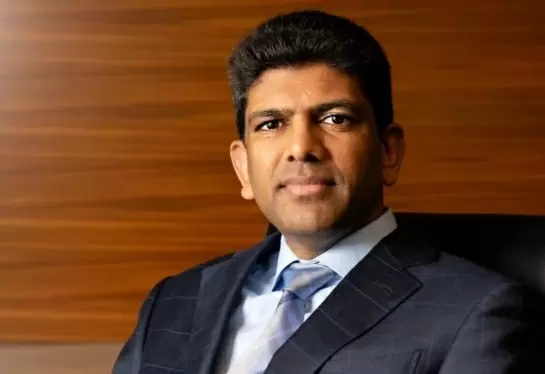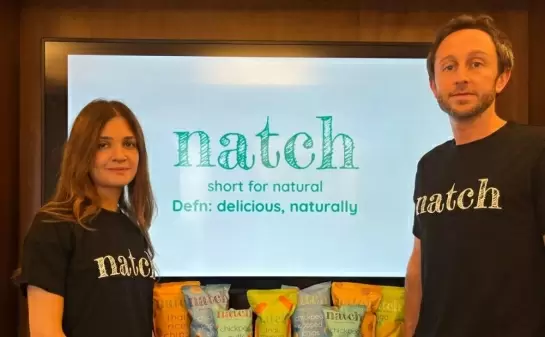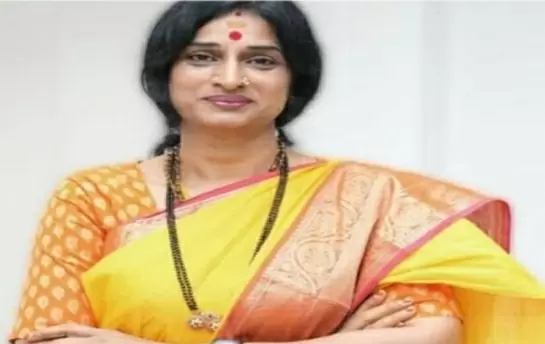Community women gain a friend and much-needed guide, a win-win situation
30-May-2016
Vol 7 | Issue 22
For nearly two decades Poonam Tiwari, 47, was a family planning worker whose job was essentially about collecting statistics. This was in the area around Kanpur, an industrial city adjoining Lucknow, the capital of Uttar Pradesh.
Although she had been tasked with visiting homes where she was supposed to talk to couples, family elders and even young women about contraception methods, institutional child birth, proper spacing between children and the pitfalls of early marriage, she never felt competent enough to give them such advice.
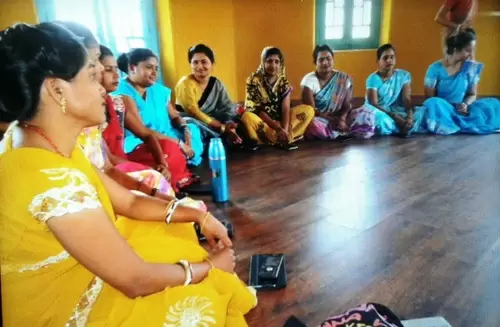 |
|
The life coaches in Shivgarh talk about themselves, their personal problems and also discuss solutions, particularly on how to prevent pregnancies and avoid abortions (Photo: WFS)
|
What she missed terribly was the art of interpersonal communication; she simply did not have the expertise to give personalised advice to women or come up with a solution in case of an emergency.
“I knew exactly what I had to say but I was not sure why the people should listen to me. I don't think I was quite sure then as to why planning one's family is good for parents and for society,” says Tiwari.
When the mostly illiterate and poverty stricken people she visited questioned her on why they should go to a hospital for the delivery of a newborn, this mother of two did not know what to say because she realised that she herself did not know the reasons.
Over time, Tiwari moved to Shivgarh, a rural administrative block of Rai Bareilly district, where, quite unexpectedly, she found herself being roped into a health intervention where she had to interact with scientists and experts working at a special lab in the area that has been looking for workable solutions to lower the maternal and infant mortality numbers in the state since 2011.
With the assistance of the female health workers like Tiwari the initiative aspired to not only connect the work of the lab to the land but gain an understanding on what local communities already knew about health issues. In addition to aiding in problem solving the health workers were responsible for making communities realise their potential to solve their own problems.
So, essentially, once she linked up with the lab Tiwari wasn’t needlessly peddling information on health issues; she developed the ability to make the right call and work with the community. For instance, once when a woman told her that goat's milk is better for a newborn than mother's milk, she didn’t feel compelled to reprimand her immediately.
She, in fact, agreed with her. “I gently told her to give the baby goat’s milk but only after breast feeding her for nine months,” she recalls. Apart from this she has been calling on women in the neighbourhood to take their help in identifying the different needs of families and individuals in the area.
Since Tiwari is no longer an outsider but someone who lives and services her community from within, from a health worker she has now become a life coach, who is responsible for the physical as well as the emotional well being of those around her.
Her job may include convincing a traditional family that a complicated pregnancy deserves a delivery in a hospital but it’s not her only mandate. And, of course, once the family begins to trust their life coach there is little resistance from members. The long-term vision is to try and make a more holistic impact on communities and to combine health care issues with social services. This is presently being achieved through a network of community volunteers from Shivgarh itself.
Today, there are 11 life coaches working in the region and Tiwari has been mentoring the group in community leadership since June 2015. One life coach is expected to serve the needs of around 600 homes. The scientists in Shivgarh want people to discover how they can first heal themselves before going to a doctor or an expensive hospital in some faraway urban centre.
Kanchan Pandey, who is training to become a life coach, decided to volunteer after an “extraordinary” experience. She was asked to keep a newborn baby that weighed three kilos and had very low body temperature at birth close to the body of the mother. “The baby survived and the result of this simple skin-to-skin therapy was so miraculous that I decided to learn more from the scientists,” recounts Pandey.
For the other life coach volunteers like Kanchan Singh, Savita, Vinosha, Priyanka and Saroj it’s their “love for children and the desire to see the little ones not only survive but also thrive in the countryside where a simple ear infection can often cause permanent deafness” that has motivated them to come on board. Tiwari elaborates that the life coach training in Shivgarh follows no cast-in-stone rules except that “an integrated approach to life be kept in mind”.
“We come together and talk about ourselves and our personal problems. We share solutions with each other, particularly on how to prevent pregnancies and to avoid abortions. Our discussions are reviewed by a panel of experts that then gives us its feedback. It’s too early right now to say how successful we have been since the idea of a life coach came into being less than a year ago, but I think we are making a contribution,” says Priyanka, a university graduate and resident of a small hamlet in the Shivgarh district.
Since the work of a life coach revolves around caring for mothers and children in the community, the male family elders are not opposed to women volunteering to take this up. In fact, Saroj’s father-in-law even bought her a two-wheeler when he saw how often she was called to help women in need at odd times of the day.
“My father-in-law is proud of my work and also babysits for me. That enthuses my husband to support me. Moreover, it helps that my mother-in-law is a teacher in the local school,” says this mother of a 15-month-old child, with a smile.
Like Tiwari, Priyanka and Saroj, Shri Kanti, too, finds her vocation extremely satisfying. She has been a life coach to about 23 pregnant women from Bedaru village and each one of them is grateful to have her in her life. Kanti, who is known to be a patient listener, usually talks to them about concepts like safe motherhood and conscious parenting.
Consequently, for the first time in their life women here have gone through an ultrasound test and seen videos of human life being conceived and born. “All this is a new, exciting experience for me, especially being able to see inside the womb,” shares Anju, a mother of four.
In the same village when Siarani, 22, expecting her first child, suffered acute stomach pain in her second month of pregnancy, Kanti helped her go through a urine and blood test. Later, she got an ultrasound test done that declared her pregnancy normal. Ever since then the young woman has been happy and relaxed. Indeed, she is looking forward to her delivery in the hospital, where she will go accompanied by her friend, confidant and life coach Kanti.
If volunteers like Tiwari and others have gained respectability as life coaches, who get to engage in a dialogue with women so that together they can come up with ways to overcome issues related to maternal and child health, then the community women have gained a friend and much-needed guide. Indeed, it’s a win-win situation for women in Shivgarh. - Women's Feature Service



